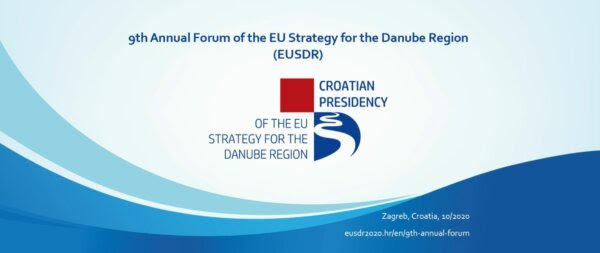The 9th Annual Forum of the EU Danube Strategy addressed the topic of sustainable development. In doing so, the Croatian Presidency of the Danube Strategy aimed at initiating an exchange on the possible ways forward in view of the European Green Deal. Nataša Tramišak, Minister of Regional Development and EU Funds of the Republic of Croatia, stressed that this year’s forum “focuses on ecology, economy and the social dimension of sustainable development as key areas for the recovery of the Danube Region.” Likewise, Nataša Tramišak called for an efficient use of EU funds and better coordination to support a swift recovery for the region.
The 9th Annual forum took place on the 22nd of October 2020 as an online conference.
Shaping a prosperous, green and connected Danube Region
In her welcome address, Commissioner Elisa Ferreira, encouraged all stakeholders of the Danube Strategy to continue their efforts to help shaping a prosperous, green and connected future for the Danube Region. These efforts will be accompanied by various measures in the context of EU Cohesion Policy. The Recovery Assistance for Cohesion and the Territories (REACT-EU) and the Just Transition Fund (JTF) will boost the necessary transition towards a sustainable Europe beyond the COVID-19 pandemic.
In response to the European Commission, Prime Minister Andrej Plenković highlighted in his speech the three political objectives of the Croatian Presidency of the EU Danube Strategy, which are strengthening the role of regional development and affirming macro-regional strategies, creating synergies between macro-regional strategies and Cohesion Policy, and cooperating closer with the countries of the Western Balkans to support the accession process.
Reinforcing political will and strengthening broad stakeholder involvement
During the 9th Annual Forum, the the Croatian Presidency organised a joint meeting of ministers responsible for the Danube Strategy. The ministers adopted a Joint Statement referring to the revised Action Plan, the Governance Architecture Paper and the embedding of the strategy in EU programmes 2021-2027. In doing so, the partner countries of the Danube Strategy agreed to improve the visibility of the Danube Strategy through a more strategic and comprehensive communication of achievements. Furthermore, the ministers endorsed the reinforcement of political support to boost the strategy’s implementation. Eventually, the statement includes a clear commitment to strengthen the support for a broad spectre of stakeholders and improve their participation and involvement in the strategy. Thereby, the ministers agreed on a particular focus on youth involvement, referring to the discussions that took place at the 7th Danube Participation Day.
Perspectives for a sustainable Danube Region
The thematic sessions provided some insights into activities in the Danube Region with a special focus on the ecological, economic, and social dimension of regional development. Giacomo Luciani from the European Commission (DG REGIO) stressed the opportunities of macro-regional strategies as coordinating platforms to improve policy delivery. In doing so, macro-regional strategies can be a good platform to promote the European Green Deal.
Likewise, Naida Mekić from the Ministry of Labour, Pension System, Family and Social Policy called for a collaborative approach to tackle the region’s challenges. If the Danube Region wants to be competitive in the up-coming years, the partner countries and regions need to stay connected.
The parallel thematic sessions discussed persectives on the state of ecosystems and ecological connectivity, how digitalisation and circular economy contribute to the European Green Deal, and how education and training can prepare the workforce for the the labour markets of tomorrow.
Next steps for 2021: Digital transition, innovation & climate change
The Annual Forum of the Danube Strategy also marked the end of the Croatian Presidency. Croatia will be succeeded by Slovakia. Michal Blaško, National Coordinator of Slovakia, thanked the Croatian colleagues for their efforts in the closing session. In addition, he presented the thematic priorities of the Slovakian Presidency that will be the digital transition, innovation and climate change. Furthermore, the Slovakian Presidency seeks to continue the embedding process of the strategy into EU programmes.


